- Home
- Jasper Fforde
The Fourth Bear Page 2
The Fourth Bear Read online
Page 2
“Did it work?”
“Of course. Believe me, once the hands really do grab your ankles when you get out of bed or the troll up the chimney does try to get you for not eating your greens, you make damn sure to do everything your parents tell you. But they’re still here,” added Jack as he looked around, “waiting in the fabric of the neighborhood. In the stone, earth and wood. Under beds and in closets. They’ll reappear when someone is leaning back on their chair, being slovenly, not eating their soup or—worst of all—sucking their thumb.”
They fell into silence and looked around, but all was normal. The summer’s night was cool and clear and the streets empty and quiet. They had been parked on Compton Avenue for twenty-five minutes, and nothing had appeared remotely out of the ordinary.
Things at the Nursery Crime Division were looking better than they had for many years, Jack admitted to himself. The success of the Humpty Dumpty inquiry four months earlier had placed himself and the NCD firmly in people’s consciousness. While not perhaps up there among cutting-edge police detection such as murder, serious robbery or the ever-popular “cold cases,” they were certainly more important than traffic or the motorcycle-display team. There were plans to increase the funding from its ridiculously low level and add a permanent staff beyond himself, DS Mary Mary and Constable Ashley.
“What’s the time?”
Ashley glanced at his watch.
“10010 past 1011.”
Jack did a quick calculation. Eighteen minutes past eleven. It was binary, of course, Ashley’s mother tongue. He generously spoke it as ones and zeros for Jack’s benefit—full-speed binary sounds like torn linen and is totally unintelligible. Ashley had no problem with English or any of the other twenty-three principal languages on the planet; it was the decimal numbering system he couldn’t get his head around. He was a Rambosian, an alien visitor from a small planet eighteen light-years away who had arrived quite unexpectedly along with 127 others four years previously. Every single one of the 70 billion or so inhabitants of Rambosia were huge fans of Earth’s prodigious output of television drama and comedy, and Ashley had been part of a mission to discover why there had never been a third series of Fawlty Towers and to interview John Cleese. But when the mission got to see just how much filing and bureaucratic data management there was on the planet, all 128 elected to stay.
Ashley had been in uniform for two years as part of the Alien Equal Opportunities Program and had found himself, after much reshuffling, at the Nursery Crime Division, where he could do no serious harm. His real name was 1001111001000100111011100100, but that was tricky to remember and even harder to pronounce. Get the emphasis wrong on the seventh digit and it could mean “My prawns have asthma.” He was about five feet tall with slender arms and legs that bent both ways at the elbows and knees. His head was twice the width of his shoulders, with big eyes, a small mouth and no nose. The UFO fraternity had got an alien’s appearance pretty much right, which surprised them all no end. His police uniform had been especially tailored to fit his unique physique, with a special elasticized girth, as Rambosians had a tendency to swell and contract depending on atmospheric pressure.
“So,” continued Jack, “ten minutes to go. What stories do Rambosians use to terrify their children into behaving themselves, Ash?”
“Vertical stripes, mainly.”
“Why?”
Jack watched Ashley think. Due to the Rambosian physiology of a translucent outer membrane filled with a blend of gelatinous liquid, Jack really could see his mind working. “Amorous linguini” was how one unkind observer put it—but that wasn’t far wrong.
“It’s the linear uniformity in the vertical plane,” Ashley explained with a shiver, and turned a darker shade of blue. “We don’t much fancy bar codes, railings or pinstripe suits either. Mind you, horizontally we have no problem with any of them—which is why we like to wear our pinstripes perpendicular to the norm.”
“I always wondered about that,” replied Jack slowly. Conversation was never easy with Ashley. There really wasn’t much in common between humans and Rambosians—except for a passionate interest in order and bureaucracy. During his lunch hour, Ashley could often be found indulging in his hobby of “carspotting,” which is like trainspotting, only with cars. On the weekends Rambosians would cluster around one of the town’s many vehicle-number-recognition cameras, where they’d all get a bit tipsy reading the binary data stream. Other than that they lived their own lives and didn’t say very much. That was the thing about aliens that no one ever really expected. They’re a bit dull.
The walkie-talkie crackled into life. “Jack, are you there?”
It was Detective Sergeant Mary Mary, Jack’s number two at the Nursery Crime Division. They had been together since the Humpty affair, and although there had been a few hiccups in the early days, they now got on well. She didn’t know why she’d been allocated to the NCD but was glad that she was. Despite its being a career black hole and the butt of many station jokes, she felt somehow that she belonged. She didn’t know why.
Jack picked up the radio and keyed the mike. “NCD-1 in position front of house. All quiet.”
“I thought I was NCD-1,” replied Mary over the airwaves. “I’m in the front line today.”
“No, you’re NCD-2. Ashley’s NCD-3, and Baker and Gretel are NCD-4 and-5.”
“I should be NCD-3,” cut in Baker. “I’ve been working part-time at the division longer than anyone.”
“Shall we stick to names?” asked Mary. “It’s going to be a lot easier.”
“Whatever. Spratt at front of house, nothing to report.”
“Good,” replied Mary. “We have thumb reentry in T minus…five minutes.”
This time there’d be no escape for the Scissor-man.
Inside the house Mary was briefing Conrad’s parents for the last time. They stared at her anxiously, but with both Jack and Ashley at the front and Gretel and Baker at the back, it seemed as safe a sting operation as they could make it.
“Your backs are to be turned for Conrad’s thumb to go in at 2330,” explained Mary as she checked her watch. “At the same time he should lean back on his chair, refuse to eat his soup and play with these matches. I’ll be in the closet and on the radio, so if we can’t catch the Scissor-man before he reaches the house, I’ll give the thumb-out order and Conrad aborts all actions. Do you understand?”
Mr. and Mrs. Hoffman looked at each other and then at Conrad, who at seventeen was old enough to understand the risks. Like many of the children in the area, he had lived in a condition of understated terror for so long that he now barely noticed. He had never had a brush with the cautionaries himself; the presence of Roland Snork in the neighborhood was enough for most children. Roland’s face was frozen in an ugly grimace because the wind had changed while he was making a face, and although the thirteen cosmetic surgeries had alleviated the problem somewhat, he was one of the more obvious warnings to uncautionary behavior. But if all went well, children like Roland wouldn’t suffer a lifetime of humiliation for a few injudiciously made faces. The parents of Cautionary Valley had banded together and unanimously voted for normality. For surly, grunty teenagers who dropped their clothes on the floor and stared vacantly out from behind lanky, unwashed hair. For untied shoelaces, messy rooms, homework left until the last moment, inappropriate boy/girlfriends and unregulated nose picking. For brooding silences, funny smells in the bathroom, hours spent on video games and ignored calls to the dinner table. It all seemed so normal, so blissful. They had phoned the police, who gladly batted it down the line to the Nursery Crime Division.
“We’re happy to go ahead, Sergeant,” said Mr. Hoffman with a dryness in his throat. “There are methods other than terror to instill discipline. We want to be like normal families, where threats of mutilation and a sorry end to achieve good behavior are met with a sarcastic, ‘Yeah, Dad, like way to go—you’re such a zoid, like, y’know. Tight.’”
He sighed deeply and turned
to his son. “Conrad? Are you happy to go ahead?”
The boy nodded his head enthusiastically.
“Yes, Father,” he replied good-naturedly, “if it is for the good of everyone. Would anyone like a sandwich or a cup of tea?”
“No, Conrad. There’ll be no more tea making for you after tonight.”
“Are you sure? I could bake you all a cake, too—and then play the piano for your entertainment before taking the dog for a walk and repainting the spare room.”
Even Mary found him a bit creepy. She didn’t have any children of her own—unless you counted her collection of exboyfriends—but children to her were meant to be something a little more than mindless automatons.
The Hoffmans hugged each other nervously, but when Mr. Hoffman shook Mary’s hand, she noticed that his left thumb was missing.
“I was one of the first,” he muttered sadly, following her gaze. “A life lived in fear is a life half lived. A life half lived is fear lived in half. A life half feared is fear half lived.”
Some people have a way with words, but Hoffman wasn’t one of them.
“What exactly is the Scissor-man?” asked Mrs. Hoffman, who found the idea of characters from cautionary tales made flesh and blood a little strange, as well she might.
“We call them PDRs,” explained Mary. “Persons of Dubious Reality. Refugees from the collective consciousness. Uninvited visitors who have fallen through the grating that divides the real from the written. They arrive with their actions hardwired due to their repetitious existence, and the older and more basic they are, the more rigidly they stick to them. Characters from cautionary tales are particularly mindless. They do what they do because it’s what they’ve always done—and it’s our job to stop them.”
“Are you sure the Nursery Crime Division is up to it?” Mrs. Hoffman added, mirroring a strongly felt suspicion within the community that the regular force wasn’t taking their concerns seriously.
“Of course,” replied Mary confidently. “Only two months ago we successfully detained a ghoulie, a ghostie and a long-legged beastie.”
“And the bump in the night?” asked Mr. Hoffman anxiously. “What about that?”
“Ah,” returned Mary, scratching her chin thoughtfully, “no, the bump got away—but I’m sure you would agree a seventy-five percent success rate in that particular operation was a very good result indeed.”
Constables Charlie Baker and Gretel Brown-Horrocks were waiting in the back garden, covering the house from the potting shed in case the Scissor-man came from that direction. Unlike Ashley, Mary and Jack, Baker and Gretel were occasional members of the NCD, brought in only when the need arose. Baker had been designated a D-minus in “public social skills” owing to his acute hypochondria and was used only for internal duties within the Reading Central police station.
“Want some Vicks?” he said to Gretel, offering her the small bottle after trying in a most noisy and unpleasant fashion to clear his sinuses, which seemed to be incessantly blocked with possibly the finest cold viruses that natural selection had managed to create.
“No thanks,” replied Gretel in her soft German accent. Her skills in forensic accountancy kept her much in demand, not only in Reading but throughout most of the Berks & Wilts constabulary. NCD work was meant to “get her out more.” She was glad that it did. At the end of the Humpty affair, she had met the man who was now her husband. He was seven foot three, and she was six foot two and a quarter. It was a match made perhaps not in heaven but certainly nearer the ceiling.
“Do you have to sniffle constantly?” she asked him.
“The sniffling’s nothing,” replied Baker. “Do you want to see my rash?”
“You showed it to me already.”
“That was a tiddler. This new one covers two-thirds of my body and has raised pimples.”
“It does not.”
“It does so—or it will soon, if my diagnosis is correct. What’s the time?”
“One minute to go. We keep our eyes open—and for God’s sake stop that sniffling.”
Baker made one great big huge supersniffle that drew everything swilling around his lower sinuses into the space between his eyes, where gravity, being the force it was, would ensure that it would not stay for long.
Back inside the house, Mary counted off the seconds on her watch. At five seconds to go, she keyed the mike on her walkie-talkie and said, “Thumb reentry T minus five seconds.”
After consulting her watch for those last five seconds, she climbed into the closet, shut the door to nothing more than a crack and signaled to the Hoffmans. They nodded sagely and began the routine they had rehearsed down the road at the supermarket, where the Scissor-man had no influence.
Mr. Hoffman, in an overly dramatic fashion, said, “We’re going to leave you here to finish your soup on your own, Conrad. Don’t play with those matches, don’t lean back on your chair, and don’t you dare suck your thumb when our backs are turned!”
They sighed, walked out of the kitchen and closed the door behind them. Conrad was now alone in the kitchen, with only Mary watching through a crack in the closet door. He stared at his thumb for a moment, having never even contemplated sucking it—not since he was first warned about the Scissor-man. His father had a missing thumb to prove it, and Conrad was always careful to avoid getting his thumb anywhere near his mouth, just in case the Scissor-man should make a mistake.
He paused for a moment, thumb outstretched, and looked at Mary again. She nodded to him and smiled. If they were to catch the Scissor-man, this was the only way. After wavering for a few more seconds, Conrad opened his mouth, and in went the thumb. He paused for a few moments then obediently carried out the plan they had rehearsed. He leaned back on his chair, idly struck a match and said petulantly, “I don’t want my soup!”
Jack and Ashley had climbed out of the car and were looking about attentively at the time the thumb went in. There was a distant rumble of thunder, and somewhere a dog barked. Other than that, nothing seemed unusual.
“What does the Great Long Red-Legg’d Scissor-man look like?” asked Ashley.
“Tall, red-legged—carries a huge pair of scissors. Believe me, you’ll know him when you see him.”
Ashley looked down at his own hands. He had three fingers and two opposable thumbs on each hand, and any of them would grow back if lost. The idea of a thumb’s not growing back hadn’t occurred to him until that morning.
Gretel and Baker were alert but, like Jack and Ashley, also to no avail. No Scissor-man—nothing. The night was clear and crisp, and the moon had risen so it was easy to see. There was nothing to be seen in either the Hoffmans’ garden or in any of the next-door gardens. There shouldn’t have been anyway. The entire neighborhood had been evacuated for the operation. Only personnel involved in the sting were in residence.
“Gretel?” came Mary’s voice over the radio. “Anything your end?”
“Nothing,” she replied.
“Stay put,” came in Jack’s voice. “We wait. Mary, is Conrad still sucking his thumb?”
Mary looked out of the closet and confirmed that yes, he was still sucking his thumb, not eating his soup and leaning back on his chair while playing with matches, something that he was actually finding great fun. They waited five minutes, then ten, then fifteen. Nothing.
Mr. Hoffman put his head around the door. “Is anything happening?”
“No, sir. We must be patient.”
Mr. Hoffman said, “Okay,” and shut the door again.
Every minute Mary would ask for a status report, and after twenty reports in as many minutes she keyed the mike and said in an exasperated tone, “Jack, when was the last cautionary-related crime?”
Jack turned to Ashley. The alien had many talents, but only a few that might have been considered useful. One that definitely had its uses was his total recall.
“Five-day accelerated starvation due to soup refusal, July ninth, 1978. Single thumbectomy on December twenty-third, 1979.
A fatal house fire on the night of January twenty-sixth, 1985, might have been match-play-related, but it was never proved.”
Jack relayed the information to Mary, who replied, “Twenty-five years since the last definite scissoring. What if he’s retired or inactive or something?”
“You mean Cautionary Valley has been living in terror for over two decades when they needn’t have?” said Gretel from her position in the back garden. “I’d be a bit pissed off if that was the case.”
“It’s a possibility,” replied Jack, “but only that. I say we give it another half hour, then abort and go away for a rethink. Briggs will have something to say about the overtime as it is.”
Everyone radioed in agreement, and all was quiet again.
“Gretel?” said Baker in the potting shed.
“What?” replied Gretel, who was thinking about tall babies.
“You’re a woman.”
“I know this.”
“Yes, well…” he said a bit awkwardly, “I just thought…do you think Pippa would go out on a date if I asked her?”
“You mean beautiful Pippa in the control room? No.”
“What do you mean, ‘No’?”
“I mean ‘No’ as in ‘No, I don’t think she’d go out with you.’”
“You might have paused for thought or something,” said Baker in an affronted tone, “or been ambiguous—to save my feelings, y’know.”
“Sorry. You ask a question and I answer it,” replied Gretel, who had a reputation for directness that sometimes didn’t sit well with higher authority. “I’ll tell you why. Remember that time you sneezed on her?”
“It wasn’t just her.”
“I know. It’s just that girls don’t really like that sort of thing.”
Baker nodded slowly. He’d suspected for a while that they might not. Still, he never thought it really fair to have a girlfriend, since he had only six months to live. The thing was, he’d had only six months to live for over thirteen years now.

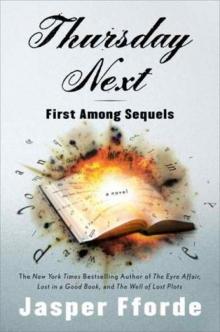 First Among Sequels
First Among Sequels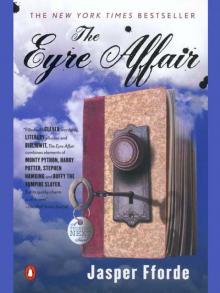 The Eyre Affair
The Eyre Affair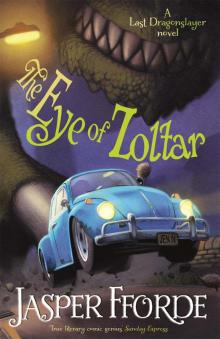 The Eye of Zoltar
The Eye of Zoltar The Woman Who Died a Lot
The Woman Who Died a Lot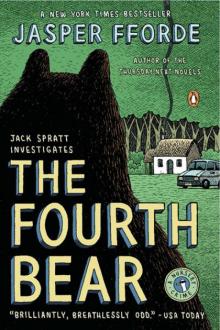 The Fourth Bear
The Fourth Bear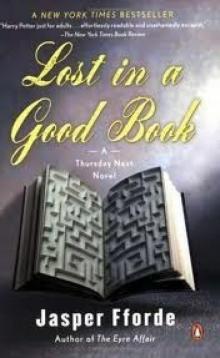 Lost in a Good Book
Lost in a Good Book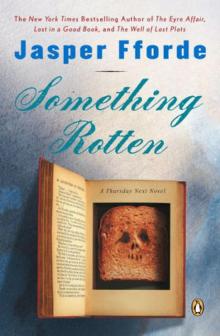 Something Rotten
Something Rotten The Well of Lost Plots
The Well of Lost Plots The Big Over Easy
The Big Over Easy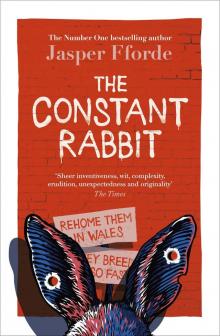 The Constant Rabbit
The Constant Rabbit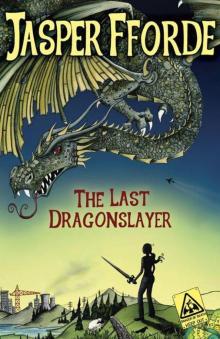 The Last Dragonslayer
The Last Dragonslayer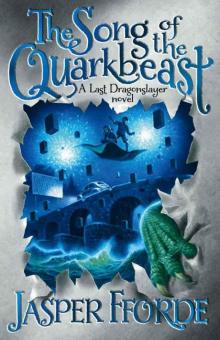 The Song of the Quarkbeast
The Song of the Quarkbeast One of Our Thursdays Is Missing
One of Our Thursdays Is Missing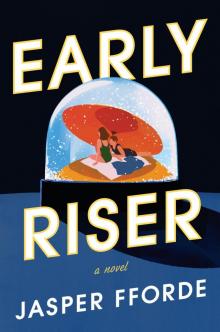 Early Riser
Early Riser Early Riser_The new standalone novel from the Number One bestselling author
Early Riser_The new standalone novel from the Number One bestselling author Something rotten n-4
Something rotten n-4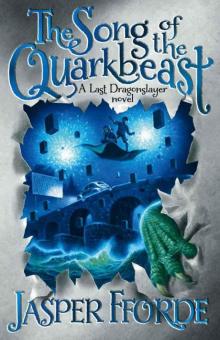 The Song of the Quarkbeast tld-2
The Song of the Quarkbeast tld-2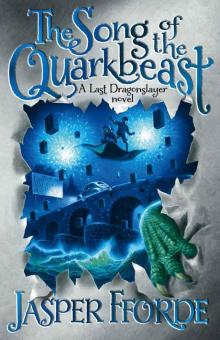 The Song of the Quarkbeast: Last Dragonslayer: Book Two
The Song of the Quarkbeast: Last Dragonslayer: Book Two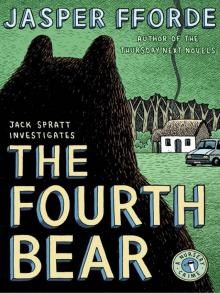 The Fourth Bear nc-2
The Fourth Bear nc-2 Lost in a Good Book tn-2
Lost in a Good Book tn-2 The Well of Lost Plots n-3
The Well of Lost Plots n-3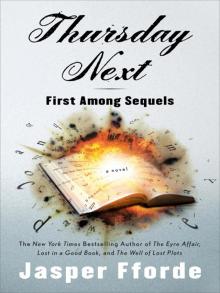 Thursday Next in First Among Sequels
Thursday Next in First Among Sequels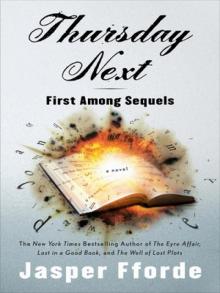 First Among Sequels tn-5
First Among Sequels tn-5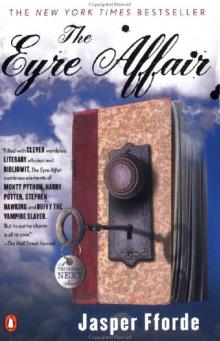 The Eyre Affair tn-1
The Eyre Affair tn-1